 |
|
Structure |
Living in the moment. The jungle claims Calakmul. The past is forgotten. (Map this!)
For several days, I have been thinking on and off, about the comment Jan made about living in the moment. I was first introduced to this theme when I was studying Sartre several years ago, about our relationship to the past and to the future. What are these places, the past and the future? The future is a fictitious place that can never be reached because it always lies just beyond our realm, our event horizon. The past is an even stranger place, crudely drawn from our very imperfect ability to remember it. It may not even exist at all, as a perfectly consistent world view can follow from the proposition that the world is only five minutes old, brilliantly constructed to appear as if it is billions of years old. Or, for some, 6,000 years old.
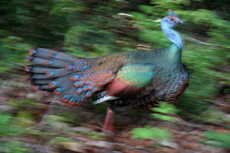 |
|
Colorful Wild Turkeys. |
The only time we can have any degree of certainty about is the moment we are living in. The time is always NOW! But, somehow, anxiety and expectation about the future and regrets and triumphs of the past color our experience of the moment. How can I free myself of these shackles and enjoy the very “now-ness” of time? Even the previous statement shows coloring of the future, it shows an expectation to “enjoy” the moment, rather than just “be”, let it just pass over like water.
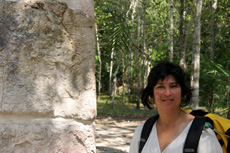 |
|
Living in the moment |
The ruined Maya city of Calakmul takes some effort to visit and a degree of roughing it while there. A huge center in its day, archaeologists have identified over 7,000 structures scattered throughout the humid jungle, including two massive Peten style pyramids that have been excavated. Calakmul fought and defeated some of the more well known Maya cities including Palenque and Tikal and extended its control over a vast region with a combination of alliance and war. Their buildings exude pride and permanence, how many of our buildings today would last over a thousand years without maintenance?
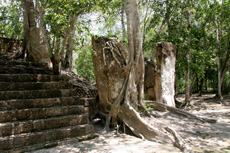 |
|
Deadly Embrace. |
Calakmul today is largely jungle, visited by the occasional intrepid tourist willing to suffer a little. Suppose that a resident of Calakmul from its heyday were to be transported here to see the crumbling buildings claimed by the trees and obliterated stelae featuring forgotten personages. Now suppose that he is transported back with the knowledge of Calakmul’s Ozymandian fate – would he work just as hard to preserve a legacy destined to be largely forgotten? Or maybe he might attempt to live more in the NOW, since that is all there really is? Calakmul is a living example that the past is destined to be forgotten, and the future never is as it is predicted to be.
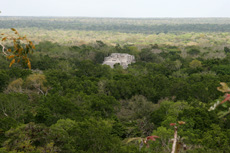 |
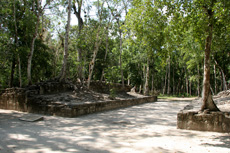 |
|
Green Tide |
Mesoamerican Ball Court |
Beautiful turkey!
As for living in the moment, yes, it would be nice to live in the moment most of the time. But arent your past and future exactly what shape your appreciation of the present moment? For example, if you see an exotic flower you have never seen before in a distant land you’re less likely to visit again in future, your mometary happiness is greater, no?
Madhuri,
Yes, it would seem that the moment you describe would be qualitatively better. But why should that be the case? Perhaps an argument can be made that every moment, if savored to its full rich extent can be just as good as any other, although it is difficult to imagine that having chemotherapy is as wonderful tasting a Alphonso mango at peak ripeness.
I think the root of the problem is making a value judgement about a given slice of existence, instead of simply connecting with the underlying bliss of just “being”.
Shreesh,
I understand what you mean by “living in the moment”. But please indulge my attempt to unweave this idea for a moment, to speak out loud some of my thoughts on this. First, considering the contrary: Is it possible to not live in the moment? What other kind of living is there? “Living” is what we call for that which we “do” in the “present”. So in a literal sense, it is strictly possible to live in the present only. But of course, we are talking here about the implied, non-literal meaning of letting go of burdens of the past and anxieties regarding the future.
Next, if we put aside the possibilities of the world not being “real” (http://en.wikipedia.org/wiki/Brain_in_a_vat, http://en.wikipedia.org/wiki/Maya_(illusion), http://faculty.washington.edu/smcohen/320/cave.htm, http://www.simulation-argument.com/simulation.html, http://en.wikipedia.org/wiki/Boltzman_brain and so on), for those do not directly bear upon the core of this discussion, assume that the only reality we get to experience is the one we find ourselves in.
In this reality, “the moment”/”present”, “the past” and “the future” are terms we use in our language to parse our reality in order to make sense of it and to perform simulations of costs/benefits of our possible actions. For a non-sentient being, there are no concepts of the past or the future, and the only sort of “living” is in what we call “the present”.
What does it mean to “just be”?. Consider “Wherever you go, there you are!”. The nontrivial reading of this seems to require the two yous to refer to different entities. One is the observed, and the other the critical observer – the giver of feedback. So “just being” requires a shutting down of the observer, or at least a shut-down of the feedback from processing of the observed data. A “running on auto-pilot” kind of living – a uber-atavistic throw to the days of our non-sentient evolutionary ancestors who operated on instinct. It seems that a sudden suppression of the critical mind does provide a brief period of high (endorphins et.al). Perhaps akin to what a baby feels before its brain develops to start modeling the world in its mind (for example: Piaget’s stage theory – http://penta.ufrgs.br/edu/telelab/3/piaget's.htm). But would a throwback to the life of a baby or a baboon, make us blissful all the time? I would think not. For example, the basic instincts of hunger etc. will be definite killjoys. I think humans want to have their cake and eat it too. We would like the planning capability of a self-contained simulator, and at the same time we would like it to shut down its feedback temporarily in a safe situation to appreciate the “unbearable lightness of being”.
Vinay, dude, I don’t remember signing up for the course! Of course you can live in the past, (see Sacks, The Man Who Mistook His Wife for a Hat)! In that case it was brain damage, but you see my point, no? To the other extreme is the discussion by the Neurologist at this year’s TED Conference who was able to observe her own stroke with a professional’s knowledge. She said that the (temporary) destruction of her left brain capabilities forced upon her a state of connectedness with every particle in the Universe – she could ONLY live in the present to the extent that language, memory and logic were gone. She really liked it! Up to a point.
Fred,
I apologize if you feel I belaboured my point too much.
Thanks for the pointer to the book, haven’t read it, will do. But when I said living strictly in the present – literally, I meant that even if you are imagining that you are living in a past, you are doing so in the present, the imagining constitutes the actual living.
Do you have a link to the Neurologist/TED conf? I’d be interested in reading that up.
Since I had already blabbered so much, I desisted from further going into brain damages et. al. But, when people say they want to live in the moment, few would be willing to be lobotomized to do so? I think it is basically a meditative connection they are talking of, example Eckhart Tolle. Although I can easily believe that the person enjoyed the state.
I came across this program on NPR in the last couple of days, where a person bitten by a rattle-snake describes among his agonies, a simultaneous connection with the present, and a keen sense of everything going on around him, which he described as highly pleasurable despite the intense pain from the poison.
Vinay,
I just couldn’t resist a chance to yank your chain! 🙂 Sorry!
Neuroanatomist Jill Bolte Taylor had an opportunity few brain scientists would wish for: One morning, she realized she was having a massive stroke. As it happened — as she felt her brain functions slip away one by one, speech, movement, understanding — she studied and remembered every moment. This is a powerful story about how our brains define us and connect us to the world and to one another.
http://www.ted.com/talks/view/id/229
All this talk about past, future, etc… All I was thinking was Ozymandian fate is CRAZY TRAIN!
http://www.youtube.com/watch?v=JRbPWcLode0
Shreesh brought books home during his school and college days. I use to read them with interest adding to that list some of my own. His pioneering spirit abounds. He proved to me during his young age that driving behind a Semi at a car length give 5 to 10 mile more per gallon depending upon speed of the truck. Those scary moments have passed.
100 year old may not have moments to live
90 year old may get his moments shortened
80 year old may count hours as his moments
70 year old may count days as his moments
60 year old may count moments by saying “oh, what a day” and repeat it for fifteen days
50 year old may count the moments for scary month before getting laid off and then start reading different religious books.
40 year old may count the moments for six month or year or more.
30 year old may count the moments during developing his career
20 year old may count the moments studying hard in order to get good grades
13 to 19 year teen counts moments in imitating parents and peers
In case of 1 to 12 year old, parents lose their moments in carrying out the responsibilities.
In short moments can be eons and eons can be moments.
Every thing has beginning and end.
Daddy
Your photographs are priceless……..as these are sites I will never see. Is this one of the most basic reasons for your trip, Neena & Shreesh, to explore these Mayan sites? I hadn’t realized they are numerous, but then, what do I know? However, this evening I did have the pleasure of hearing John Muir speak–(the Yosemite explorer)! Barbara
Hi Barbara,
Yes, the “Ruta Maya” was definitely a “must do” for us. Little did we realize that there are literally tens of smaller sites! So we still cannot see all of them but we did see quite a few. You can see them on the Maps page, with tiny pictures. I will be uploading a slideshow page soon, hopefully with bigger pictures.